Research Report: Effective Talent Management Strategies - Unilever
VerifiedAdded on 2023/06/15
|30
|6375
|109
Report
AI Summary
This report investigates effective talent management strategies for organizational success, using Unilever as a case study. It examines the importance of talent management, explores Unilever's specific strategies like employee training, performance tracking, and career development paths, and recommends benefits such as automated candidate management and succession planning. The research methodology employs a positivism philosophy, deductive approach, and survey strategy, utilizing a cross-sectional time horizon for data collection and analysis. The findings are discussed and analyzed to provide insights into optimizing talent management practices for improved employee motivation, retention, and overall organizational performance. Desklib provides access to similar solved assignments and resources.
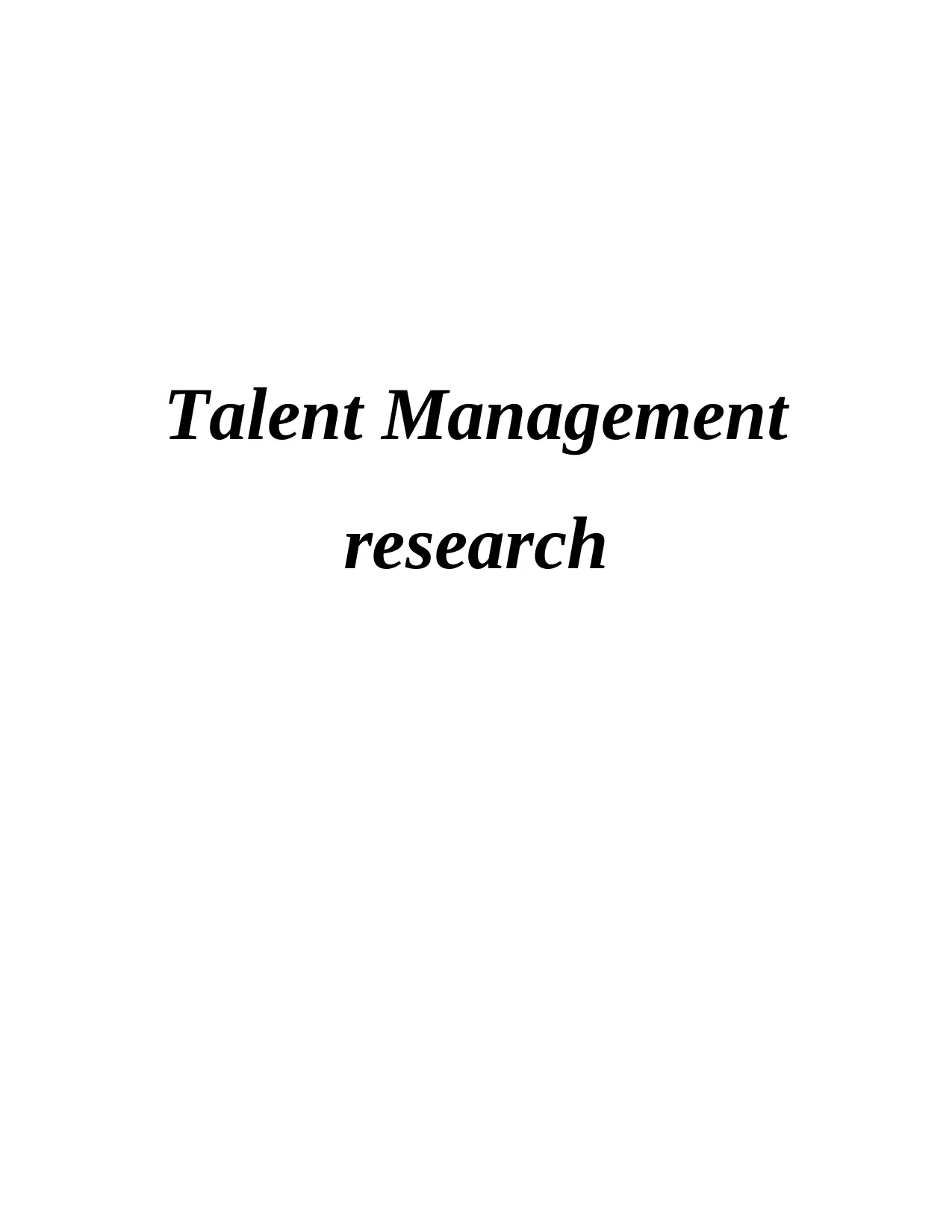
Talent Management
research
research
Paraphrase This Document
Need a fresh take? Get an instant paraphrase of this document with our AI Paraphraser
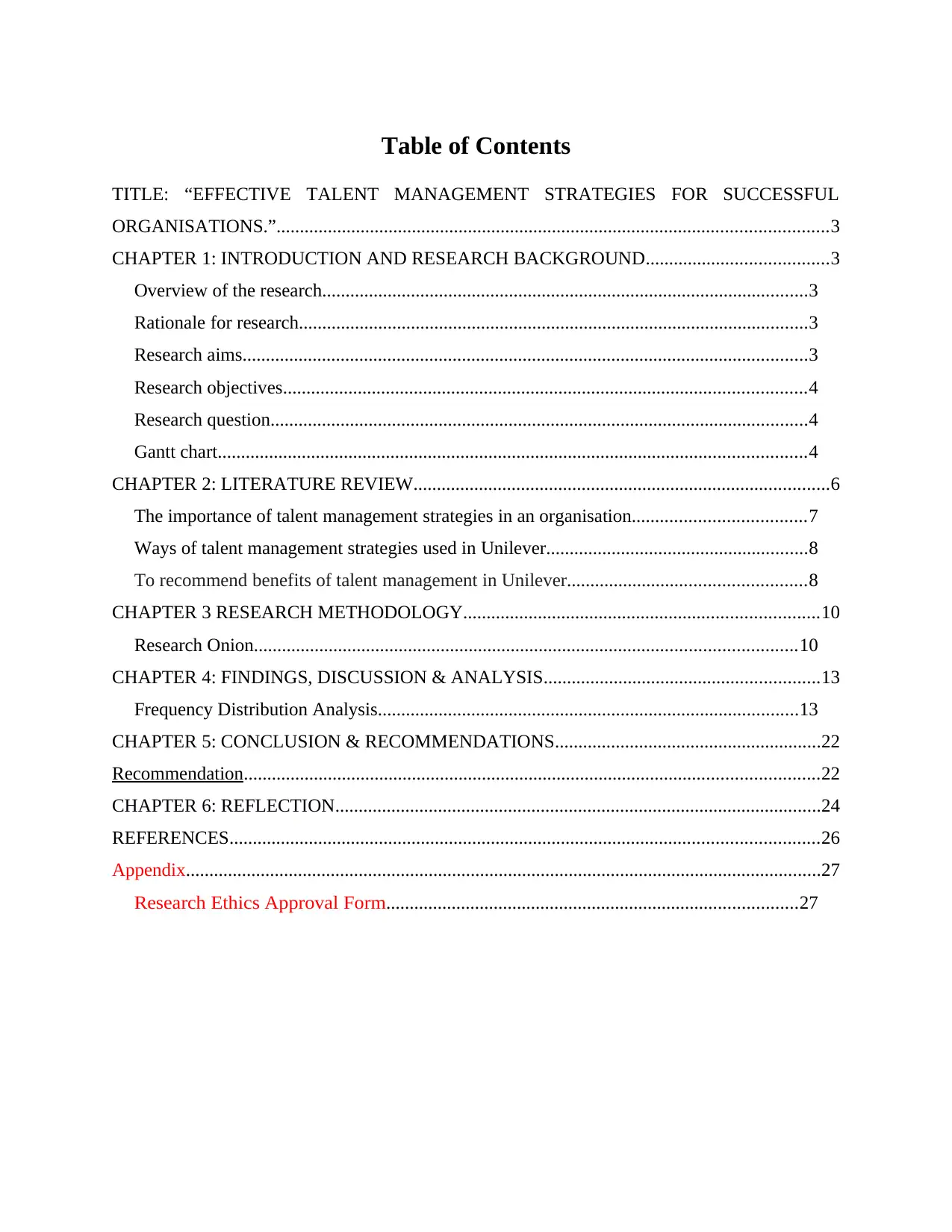
Table of Contents
TITLE: “EFFECTIVE TALENT MANAGEMENT STRATEGIES FOR SUCCESSFUL
ORGANISATIONS.”......................................................................................................................3
CHAPTER 1: INTRODUCTION AND RESEARCH BACKGROUND.......................................3
Overview of the research........................................................................................................3
Rationale for research.............................................................................................................3
Research aims.........................................................................................................................3
Research objectives................................................................................................................4
Research question...................................................................................................................4
Gantt chart..............................................................................................................................4
CHAPTER 2: LITERATURE REVIEW.........................................................................................6
The importance of talent management strategies in an organisation.....................................7
Ways of talent management strategies used in Unilever........................................................8
To recommend benefits of talent management in Unilever...................................................8
CHAPTER 3 RESEARCH METHODOLOGY............................................................................10
Research Onion....................................................................................................................10
CHAPTER 4: FINDINGS, DISCUSSION & ANALYSIS...........................................................13
Frequency Distribution Analysis..........................................................................................13
CHAPTER 5: CONCLUSION & RECOMMENDATIONS.........................................................22
Recommendation...........................................................................................................................22
CHAPTER 6: REFLECTION........................................................................................................24
REFERENCES..............................................................................................................................26
Appendix........................................................................................................................................27
Research Ethics Approval Form........................................................................................27
TITLE: “EFFECTIVE TALENT MANAGEMENT STRATEGIES FOR SUCCESSFUL
ORGANISATIONS.”......................................................................................................................3
CHAPTER 1: INTRODUCTION AND RESEARCH BACKGROUND.......................................3
Overview of the research........................................................................................................3
Rationale for research.............................................................................................................3
Research aims.........................................................................................................................3
Research objectives................................................................................................................4
Research question...................................................................................................................4
Gantt chart..............................................................................................................................4
CHAPTER 2: LITERATURE REVIEW.........................................................................................6
The importance of talent management strategies in an organisation.....................................7
Ways of talent management strategies used in Unilever........................................................8
To recommend benefits of talent management in Unilever...................................................8
CHAPTER 3 RESEARCH METHODOLOGY............................................................................10
Research Onion....................................................................................................................10
CHAPTER 4: FINDINGS, DISCUSSION & ANALYSIS...........................................................13
Frequency Distribution Analysis..........................................................................................13
CHAPTER 5: CONCLUSION & RECOMMENDATIONS.........................................................22
Recommendation...........................................................................................................................22
CHAPTER 6: REFLECTION........................................................................................................24
REFERENCES..............................................................................................................................26
Appendix........................................................................................................................................27
Research Ethics Approval Form........................................................................................27
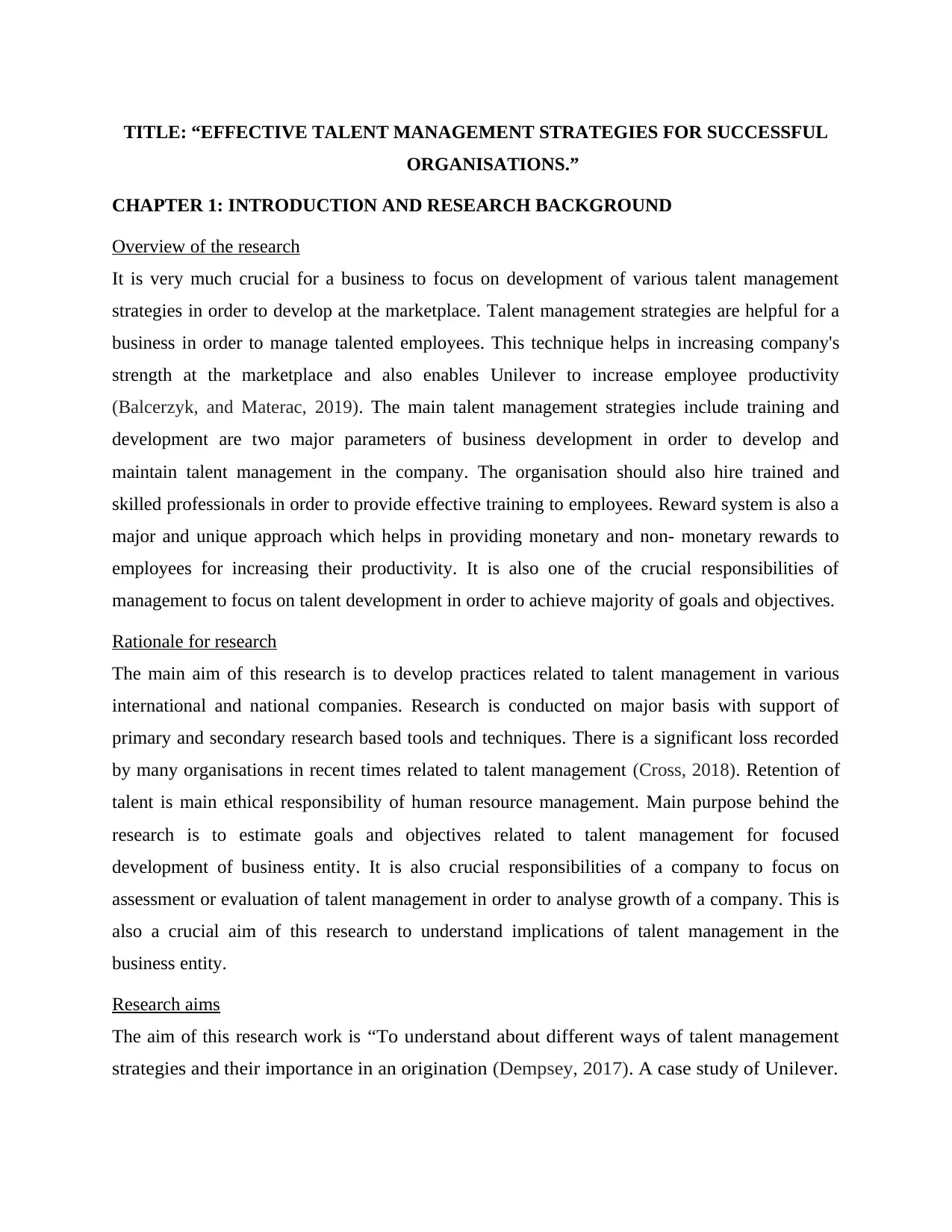
TITLE: “EFFECTIVE TALENT MANAGEMENT STRATEGIES FOR SUCCESSFUL
ORGANISATIONS.”
CHAPTER 1: INTRODUCTION AND RESEARCH BACKGROUND
Overview of the research
It is very much crucial for a business to focus on development of various talent management
strategies in order to develop at the marketplace. Talent management strategies are helpful for a
business in order to manage talented employees. This technique helps in increasing company's
strength at the marketplace and also enables Unilever to increase employee productivity
(Balcerzyk, and Materac, 2019). The main talent management strategies include training and
development are two major parameters of business development in order to develop and
maintain talent management in the company. The organisation should also hire trained and
skilled professionals in order to provide effective training to employees. Reward system is also a
major and unique approach which helps in providing monetary and non- monetary rewards to
employees for increasing their productivity. It is also one of the crucial responsibilities of
management to focus on talent development in order to achieve majority of goals and objectives.
Rationale for research
The main aim of this research is to develop practices related to talent management in various
international and national companies. Research is conducted on major basis with support of
primary and secondary research based tools and techniques. There is a significant loss recorded
by many organisations in recent times related to talent management (Cross, 2018). Retention of
talent is main ethical responsibility of human resource management. Main purpose behind the
research is to estimate goals and objectives related to talent management for focused
development of business entity. It is also crucial responsibilities of a company to focus on
assessment or evaluation of talent management in order to analyse growth of a company. This is
also a crucial aim of this research to understand implications of talent management in the
business entity.
Research aims
The aim of this research work is “To understand about different ways of talent management
strategies and their importance in an origination (Dempsey, 2017). A case study of Unilever.
ORGANISATIONS.”
CHAPTER 1: INTRODUCTION AND RESEARCH BACKGROUND
Overview of the research
It is very much crucial for a business to focus on development of various talent management
strategies in order to develop at the marketplace. Talent management strategies are helpful for a
business in order to manage talented employees. This technique helps in increasing company's
strength at the marketplace and also enables Unilever to increase employee productivity
(Balcerzyk, and Materac, 2019). The main talent management strategies include training and
development are two major parameters of business development in order to develop and
maintain talent management in the company. The organisation should also hire trained and
skilled professionals in order to provide effective training to employees. Reward system is also a
major and unique approach which helps in providing monetary and non- monetary rewards to
employees for increasing their productivity. It is also one of the crucial responsibilities of
management to focus on talent development in order to achieve majority of goals and objectives.
Rationale for research
The main aim of this research is to develop practices related to talent management in various
international and national companies. Research is conducted on major basis with support of
primary and secondary research based tools and techniques. There is a significant loss recorded
by many organisations in recent times related to talent management (Cross, 2018). Retention of
talent is main ethical responsibility of human resource management. Main purpose behind the
research is to estimate goals and objectives related to talent management for focused
development of business entity. It is also crucial responsibilities of a company to focus on
assessment or evaluation of talent management in order to analyse growth of a company. This is
also a crucial aim of this research to understand implications of talent management in the
business entity.
Research aims
The aim of this research work is “To understand about different ways of talent management
strategies and their importance in an origination (Dempsey, 2017). A case study of Unilever.
⊘ This is a preview!⊘
Do you want full access?
Subscribe today to unlock all pages.

Trusted by 1+ million students worldwide
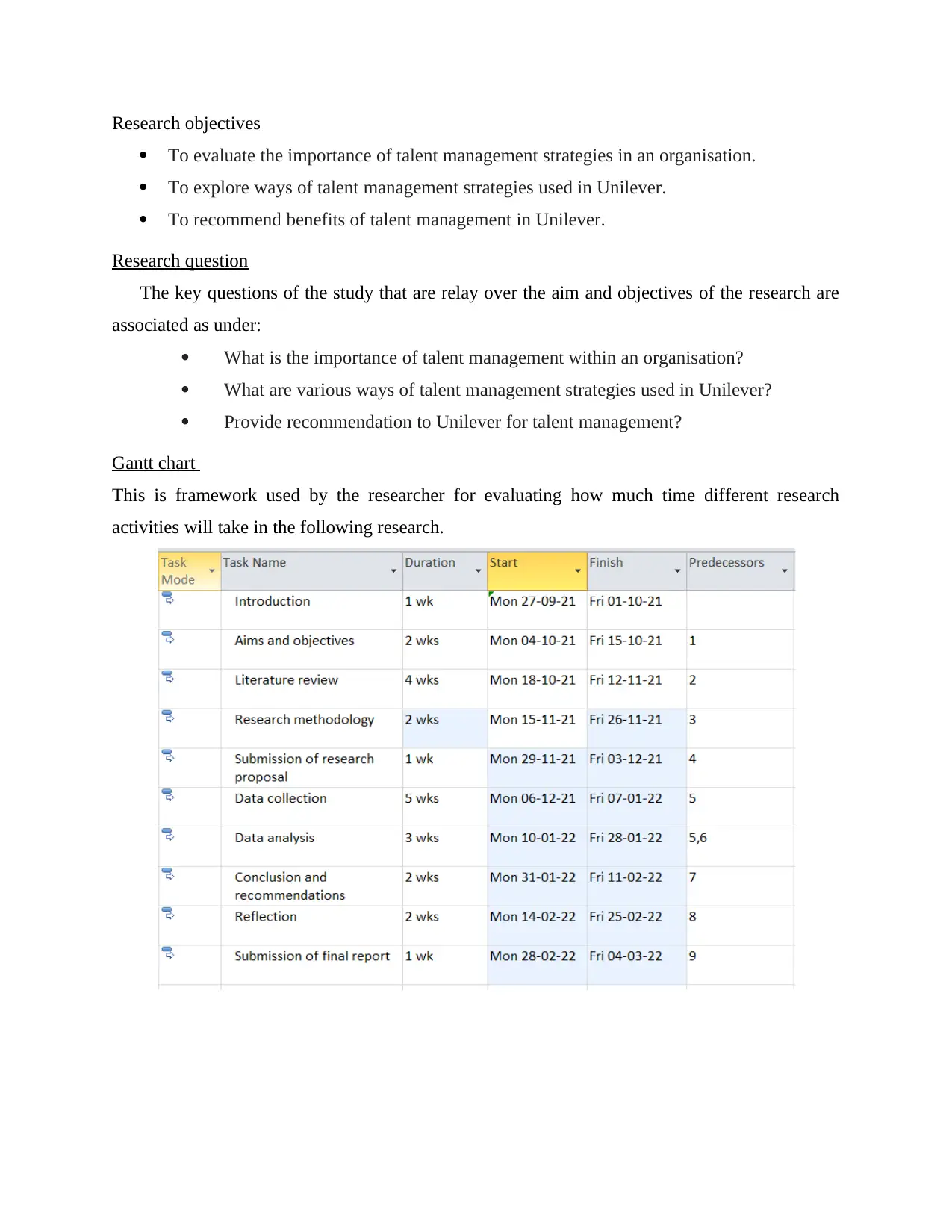
Research objectives
To evaluate the importance of talent management strategies in an organisation.
To explore ways of talent management strategies used in Unilever.
To recommend benefits of talent management in Unilever.
Research question
The key questions of the study that are relay over the aim and objectives of the research are
associated as under:
What is the importance of talent management within an organisation?
What are various ways of talent management strategies used in Unilever?
Provide recommendation to Unilever for talent management?
Gantt chart
This is framework used by the researcher for evaluating how much time different research
activities will take in the following research.
To evaluate the importance of talent management strategies in an organisation.
To explore ways of talent management strategies used in Unilever.
To recommend benefits of talent management in Unilever.
Research question
The key questions of the study that are relay over the aim and objectives of the research are
associated as under:
What is the importance of talent management within an organisation?
What are various ways of talent management strategies used in Unilever?
Provide recommendation to Unilever for talent management?
Gantt chart
This is framework used by the researcher for evaluating how much time different research
activities will take in the following research.
Paraphrase This Document
Need a fresh take? Get an instant paraphrase of this document with our AI Paraphraser
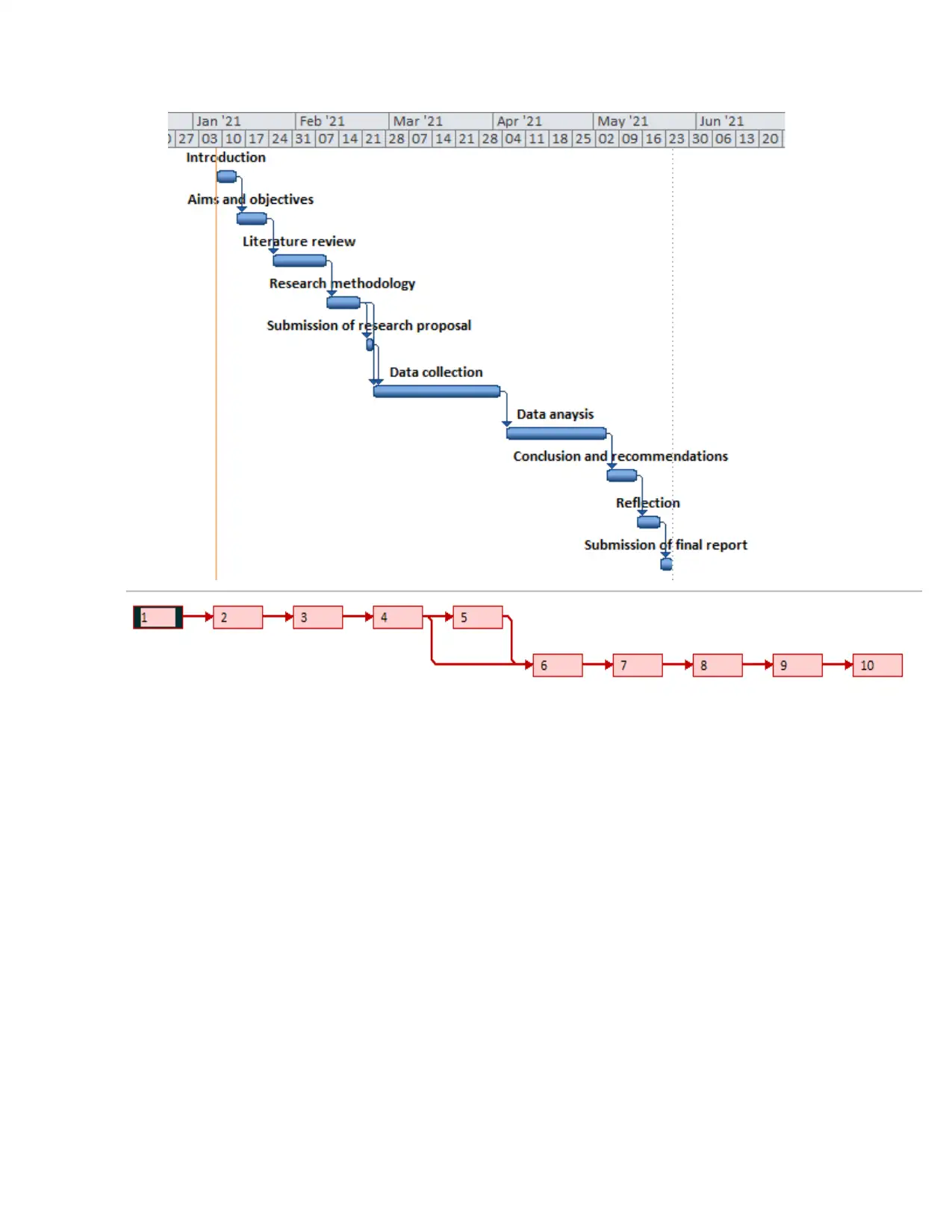
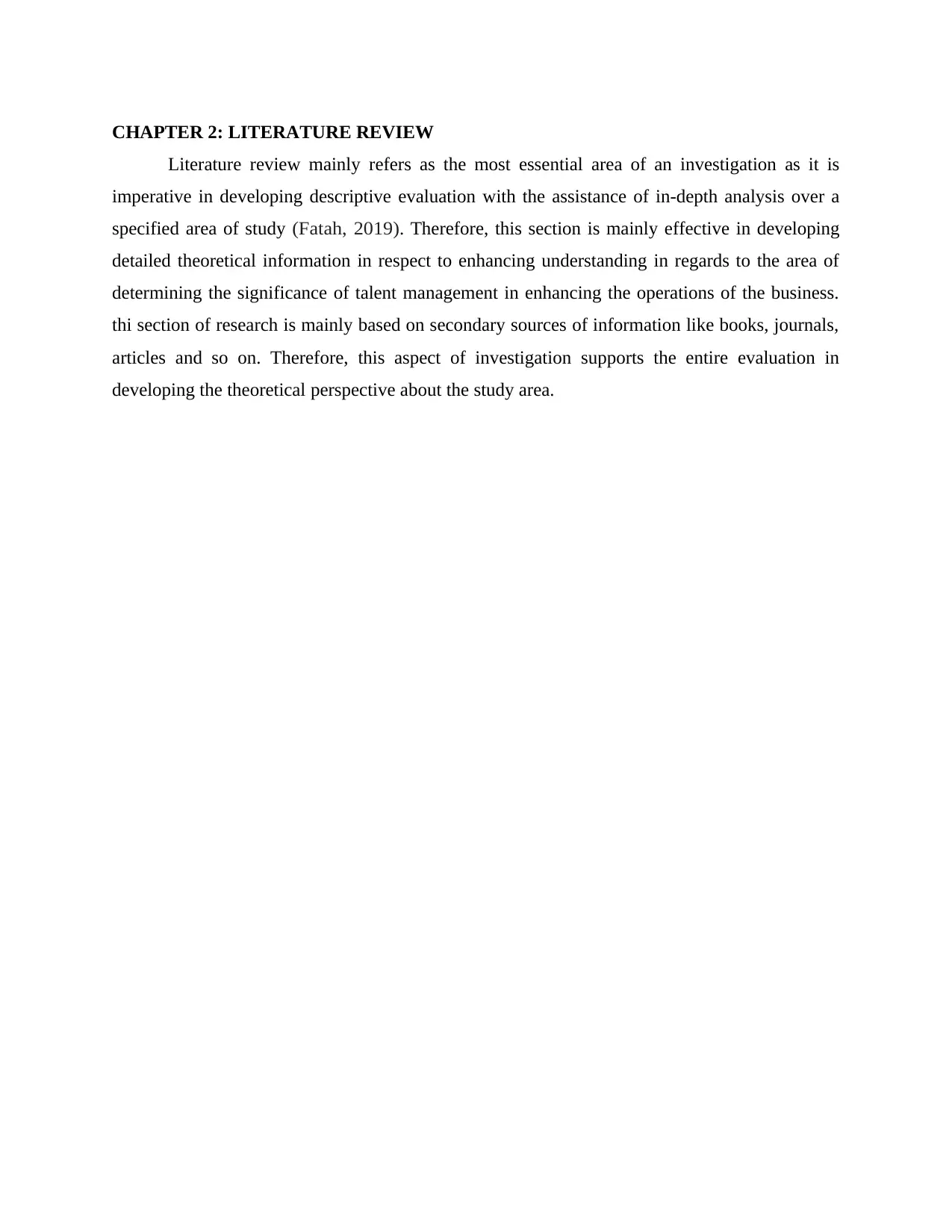
CHAPTER 2: LITERATURE REVIEW
Literature review mainly refers as the most essential area of an investigation as it is
imperative in developing descriptive evaluation with the assistance of in-depth analysis over a
specified area of study (Fatah, 2019). Therefore, this section is mainly effective in developing
detailed theoretical information in respect to enhancing understanding in regards to the area of
determining the significance of talent management in enhancing the operations of the business.
thi section of research is mainly based on secondary sources of information like books, journals,
articles and so on. Therefore, this aspect of investigation supports the entire evaluation in
developing the theoretical perspective about the study area.
Literature review mainly refers as the most essential area of an investigation as it is
imperative in developing descriptive evaluation with the assistance of in-depth analysis over a
specified area of study (Fatah, 2019). Therefore, this section is mainly effective in developing
detailed theoretical information in respect to enhancing understanding in regards to the area of
determining the significance of talent management in enhancing the operations of the business.
thi section of research is mainly based on secondary sources of information like books, journals,
articles and so on. Therefore, this aspect of investigation supports the entire evaluation in
developing the theoretical perspective about the study area.
⊘ This is a preview!⊘
Do you want full access?
Subscribe today to unlock all pages.

Trusted by 1+ million students worldwide
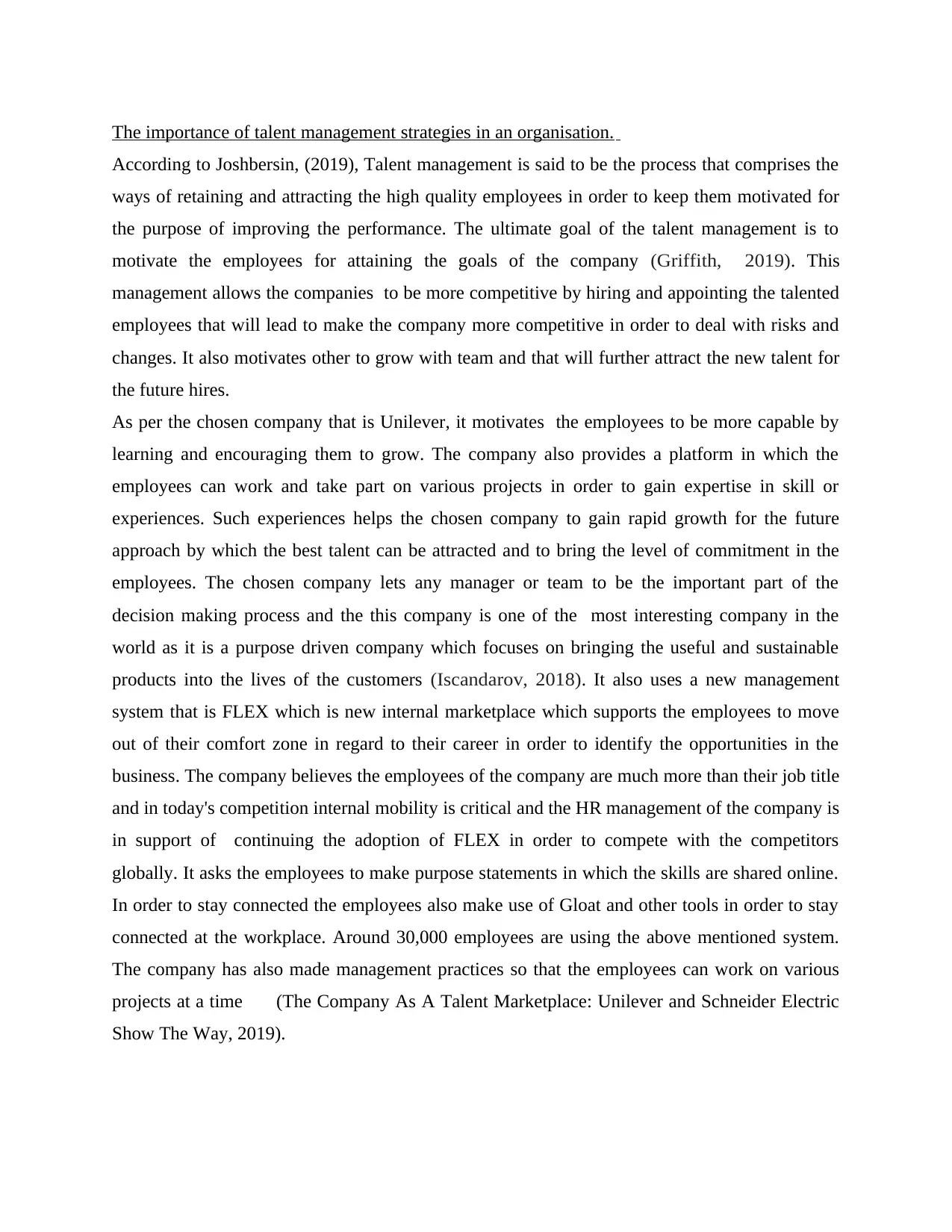
The importance of talent management strategies in an organisation.
According to Joshbersin, (2019), Talent management is said to be the process that comprises the
ways of retaining and attracting the high quality employees in order to keep them motivated for
the purpose of improving the performance. The ultimate goal of the talent management is to
motivate the employees for attaining the goals of the company (Griffith, 2019). This
management allows the companies to be more competitive by hiring and appointing the talented
employees that will lead to make the company more competitive in order to deal with risks and
changes. It also motivates other to grow with team and that will further attract the new talent for
the future hires.
As per the chosen company that is Unilever, it motivates the employees to be more capable by
learning and encouraging them to grow. The company also provides a platform in which the
employees can work and take part on various projects in order to gain expertise in skill or
experiences. Such experiences helps the chosen company to gain rapid growth for the future
approach by which the best talent can be attracted and to bring the level of commitment in the
employees. The chosen company lets any manager or team to be the important part of the
decision making process and the this company is one of the most interesting company in the
world as it is a purpose driven company which focuses on bringing the useful and sustainable
products into the lives of the customers (Iscandarov, 2018). It also uses a new management
system that is FLEX which is new internal marketplace which supports the employees to move
out of their comfort zone in regard to their career in order to identify the opportunities in the
business. The company believes the employees of the company are much more than their job title
and in today's competition internal mobility is critical and the HR management of the company is
in support of continuing the adoption of FLEX in order to compete with the competitors
globally. It asks the employees to make purpose statements in which the skills are shared online.
In order to stay connected the employees also make use of Gloat and other tools in order to stay
connected at the workplace. Around 30,000 employees are using the above mentioned system.
The company has also made management practices so that the employees can work on various
projects at a time (The Company As A Talent Marketplace: Unilever and Schneider Electric
Show The Way, 2019).
According to Joshbersin, (2019), Talent management is said to be the process that comprises the
ways of retaining and attracting the high quality employees in order to keep them motivated for
the purpose of improving the performance. The ultimate goal of the talent management is to
motivate the employees for attaining the goals of the company (Griffith, 2019). This
management allows the companies to be more competitive by hiring and appointing the talented
employees that will lead to make the company more competitive in order to deal with risks and
changes. It also motivates other to grow with team and that will further attract the new talent for
the future hires.
As per the chosen company that is Unilever, it motivates the employees to be more capable by
learning and encouraging them to grow. The company also provides a platform in which the
employees can work and take part on various projects in order to gain expertise in skill or
experiences. Such experiences helps the chosen company to gain rapid growth for the future
approach by which the best talent can be attracted and to bring the level of commitment in the
employees. The chosen company lets any manager or team to be the important part of the
decision making process and the this company is one of the most interesting company in the
world as it is a purpose driven company which focuses on bringing the useful and sustainable
products into the lives of the customers (Iscandarov, 2018). It also uses a new management
system that is FLEX which is new internal marketplace which supports the employees to move
out of their comfort zone in regard to their career in order to identify the opportunities in the
business. The company believes the employees of the company are much more than their job title
and in today's competition internal mobility is critical and the HR management of the company is
in support of continuing the adoption of FLEX in order to compete with the competitors
globally. It asks the employees to make purpose statements in which the skills are shared online.
In order to stay connected the employees also make use of Gloat and other tools in order to stay
connected at the workplace. Around 30,000 employees are using the above mentioned system.
The company has also made management practices so that the employees can work on various
projects at a time (The Company As A Talent Marketplace: Unilever and Schneider Electric
Show The Way, 2019).
Paraphrase This Document
Need a fresh take? Get an instant paraphrase of this document with our AI Paraphraser
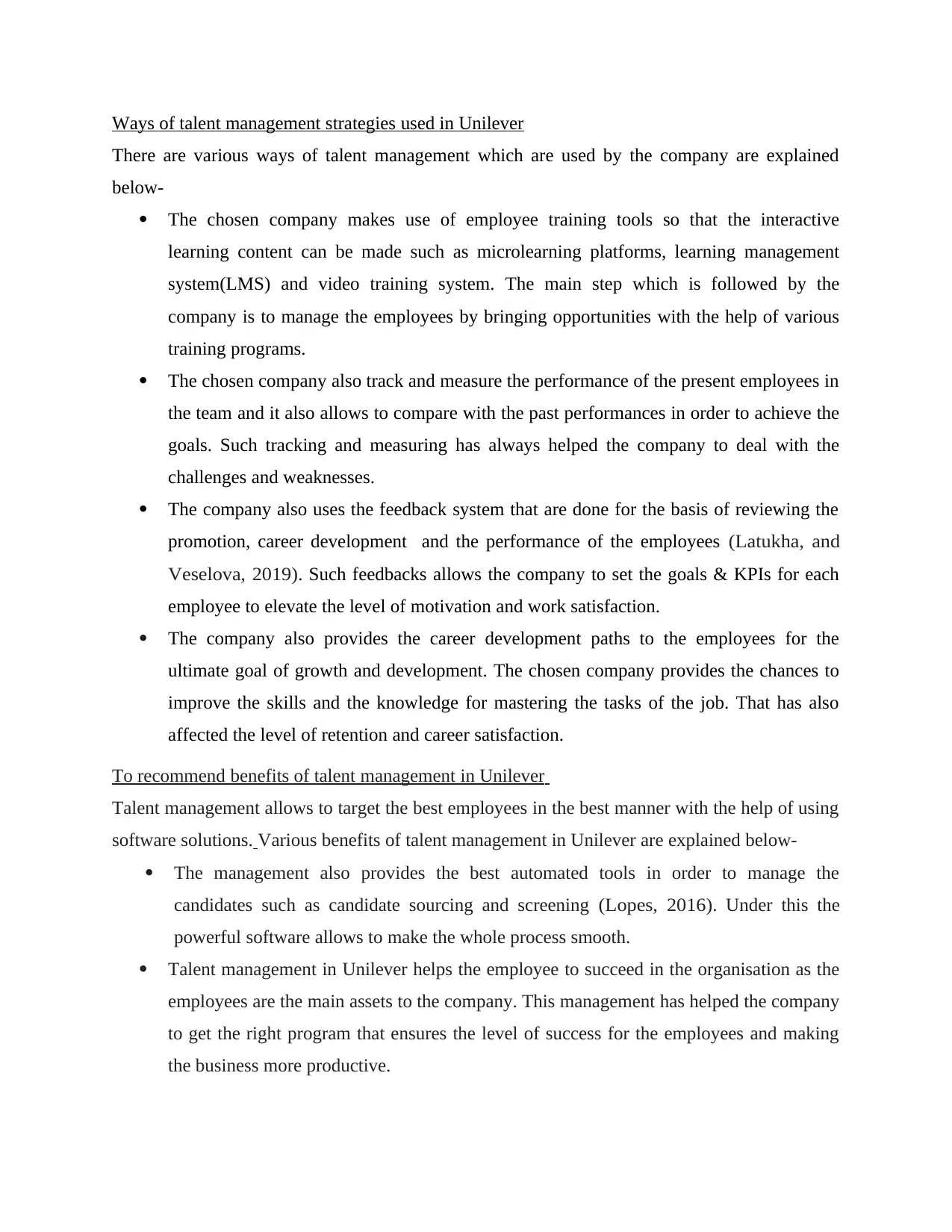
Ways of talent management strategies used in Unilever
There are various ways of talent management which are used by the company are explained
below-
The chosen company makes use of employee training tools so that the interactive
learning content can be made such as microlearning platforms, learning management
system(LMS) and video training system. The main step which is followed by the
company is to manage the employees by bringing opportunities with the help of various
training programs.
The chosen company also track and measure the performance of the present employees in
the team and it also allows to compare with the past performances in order to achieve the
goals. Such tracking and measuring has always helped the company to deal with the
challenges and weaknesses.
The company also uses the feedback system that are done for the basis of reviewing the
promotion, career development and the performance of the employees (Latukha, and
Veselova, 2019). Such feedbacks allows the company to set the goals & KPIs for each
employee to elevate the level of motivation and work satisfaction.
The company also provides the career development paths to the employees for the
ultimate goal of growth and development. The chosen company provides the chances to
improve the skills and the knowledge for mastering the tasks of the job. That has also
affected the level of retention and career satisfaction.
To recommend benefits of talent management in Unilever
Talent management allows to target the best employees in the best manner with the help of using
software solutions. Various benefits of talent management in Unilever are explained below-
The management also provides the best automated tools in order to manage the
candidates such as candidate sourcing and screening (Lopes, 2016). Under this the
powerful software allows to make the whole process smooth.
Talent management in Unilever helps the employee to succeed in the organisation as the
employees are the main assets to the company. This management has helped the company
to get the right program that ensures the level of success for the employees and making
the business more productive.
There are various ways of talent management which are used by the company are explained
below-
The chosen company makes use of employee training tools so that the interactive
learning content can be made such as microlearning platforms, learning management
system(LMS) and video training system. The main step which is followed by the
company is to manage the employees by bringing opportunities with the help of various
training programs.
The chosen company also track and measure the performance of the present employees in
the team and it also allows to compare with the past performances in order to achieve the
goals. Such tracking and measuring has always helped the company to deal with the
challenges and weaknesses.
The company also uses the feedback system that are done for the basis of reviewing the
promotion, career development and the performance of the employees (Latukha, and
Veselova, 2019). Such feedbacks allows the company to set the goals & KPIs for each
employee to elevate the level of motivation and work satisfaction.
The company also provides the career development paths to the employees for the
ultimate goal of growth and development. The chosen company provides the chances to
improve the skills and the knowledge for mastering the tasks of the job. That has also
affected the level of retention and career satisfaction.
To recommend benefits of talent management in Unilever
Talent management allows to target the best employees in the best manner with the help of using
software solutions. Various benefits of talent management in Unilever are explained below-
The management also provides the best automated tools in order to manage the
candidates such as candidate sourcing and screening (Lopes, 2016). Under this the
powerful software allows to make the whole process smooth.
Talent management in Unilever helps the employee to succeed in the organisation as the
employees are the main assets to the company. This management has helped the company
to get the right program that ensures the level of success for the employees and making
the business more productive.
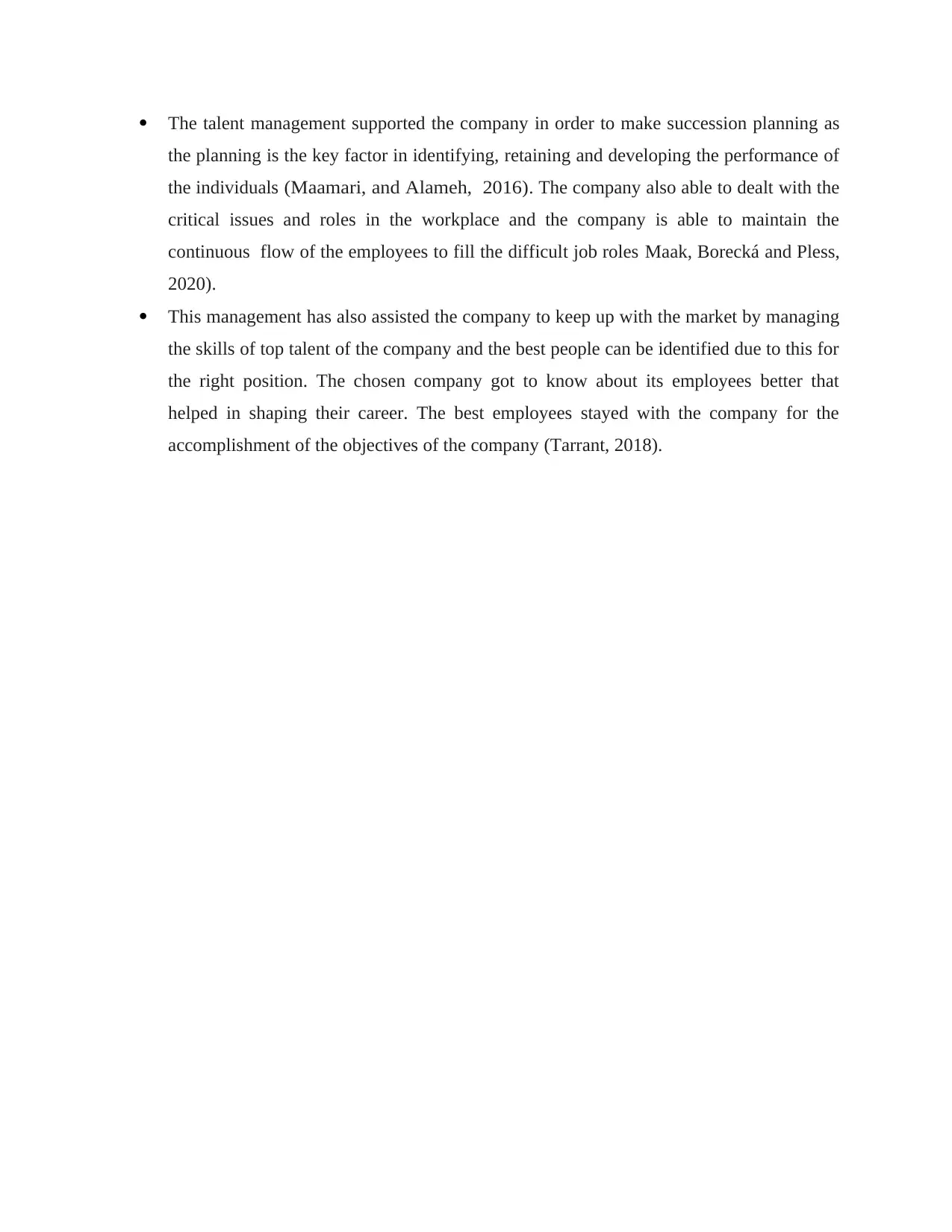
The talent management supported the company in order to make succession planning as
the planning is the key factor in identifying, retaining and developing the performance of
the individuals (Maamari, and Alameh, 2016). The company also able to dealt with the
critical issues and roles in the workplace and the company is able to maintain the
continuous flow of the employees to fill the difficult job roles Maak, Borecká and Pless,
2020).
This management has also assisted the company to keep up with the market by managing
the skills of top talent of the company and the best people can be identified due to this for
the right position. The chosen company got to know about its employees better that
helped in shaping their career. The best employees stayed with the company for the
accomplishment of the objectives of the company (Tarrant, 2018).
the planning is the key factor in identifying, retaining and developing the performance of
the individuals (Maamari, and Alameh, 2016). The company also able to dealt with the
critical issues and roles in the workplace and the company is able to maintain the
continuous flow of the employees to fill the difficult job roles Maak, Borecká and Pless,
2020).
This management has also assisted the company to keep up with the market by managing
the skills of top talent of the company and the best people can be identified due to this for
the right position. The chosen company got to know about its employees better that
helped in shaping their career. The best employees stayed with the company for the
accomplishment of the objectives of the company (Tarrant, 2018).
⊘ This is a preview!⊘
Do you want full access?
Subscribe today to unlock all pages.

Trusted by 1+ million students worldwide
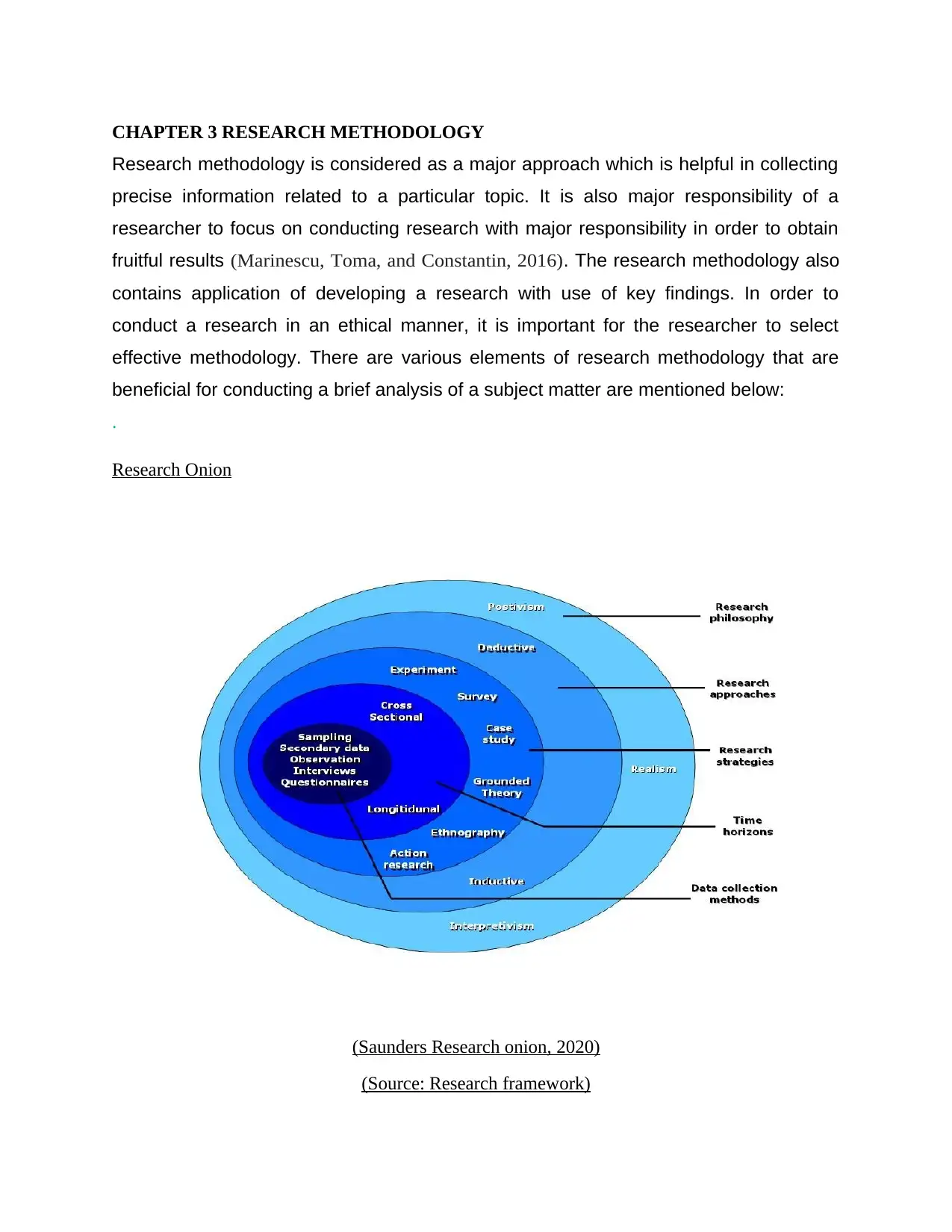
CHAPTER 3 RESEARCH METHODOLOGY
Research methodology is considered as a major approach which is helpful in collecting
precise information related to a particular topic. It is also major responsibility of a
researcher to focus on conducting research with major responsibility in order to obtain
fruitful results (Marinescu, Toma, and Constantin, 2016). The research methodology also
contains application of developing a research with use of key findings. In order to
conduct a research in an ethical manner, it is important for the researcher to select
effective methodology. There are various elements of research methodology that are
beneficial for conducting a brief analysis of a subject matter are mentioned below:
.
Research Onion
(Saunders Research onion, 2020)
(Source: Research framework)
Research methodology is considered as a major approach which is helpful in collecting
precise information related to a particular topic. It is also major responsibility of a
researcher to focus on conducting research with major responsibility in order to obtain
fruitful results (Marinescu, Toma, and Constantin, 2016). The research methodology also
contains application of developing a research with use of key findings. In order to
conduct a research in an ethical manner, it is important for the researcher to select
effective methodology. There are various elements of research methodology that are
beneficial for conducting a brief analysis of a subject matter are mentioned below:
.
Research Onion
(Saunders Research onion, 2020)
(Source: Research framework)
Paraphrase This Document
Need a fresh take? Get an instant paraphrase of this document with our AI Paraphraser
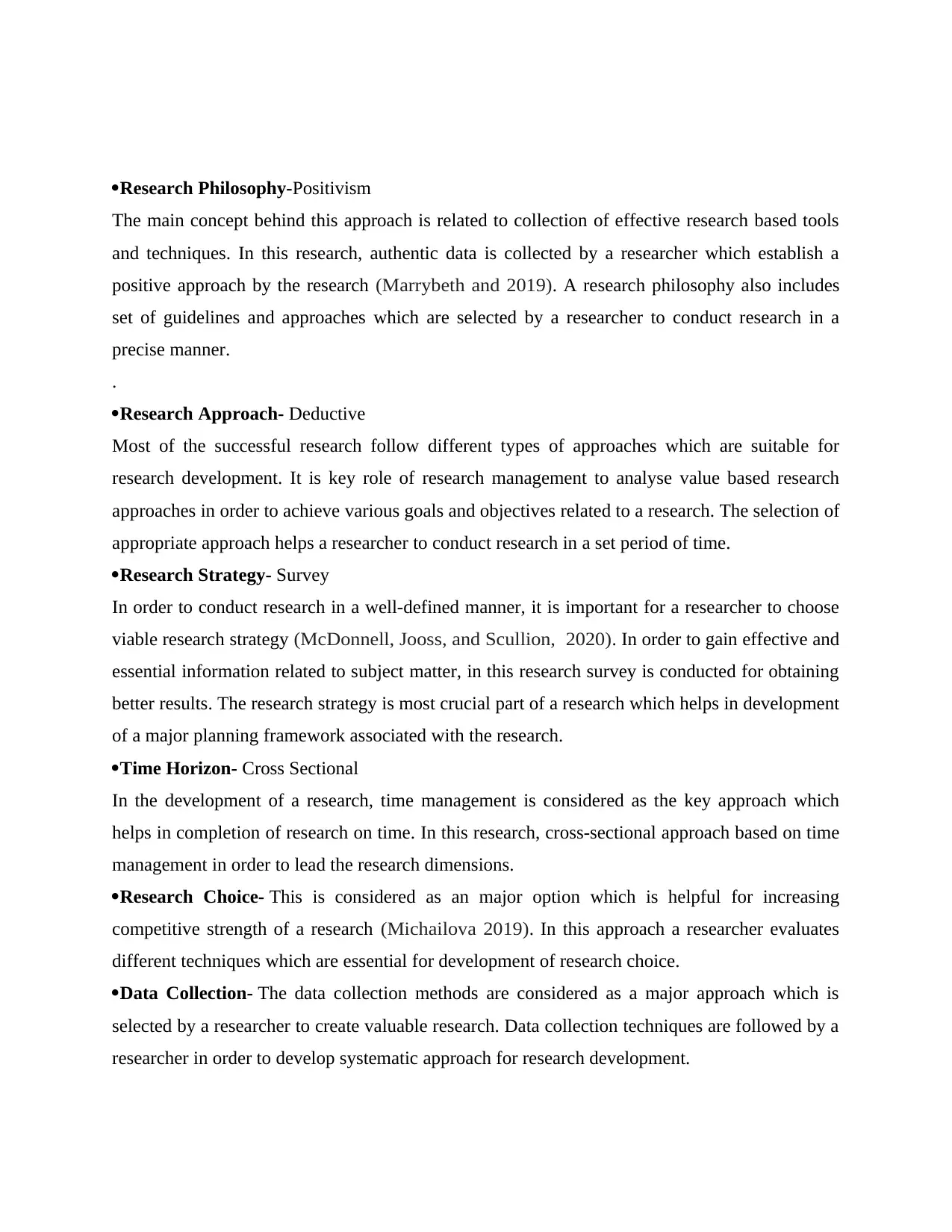
Research Philosophy-Positivism
The main concept behind this approach is related to collection of effective research based tools
and techniques. In this research, authentic data is collected by a researcher which establish a
positive approach by the research (Marrybeth and 2019). A research philosophy also includes
set of guidelines and approaches which are selected by a researcher to conduct research in a
precise manner.
.
Research Approach- Deductive
Most of the successful research follow different types of approaches which are suitable for
research development. It is key role of research management to analyse value based research
approaches in order to achieve various goals and objectives related to a research. The selection of
appropriate approach helps a researcher to conduct research in a set period of time.
Research Strategy- Survey
In order to conduct research in a well-defined manner, it is important for a researcher to choose
viable research strategy (McDonnell, Jooss, and Scullion, 2020). In order to gain effective and
essential information related to subject matter, in this research survey is conducted for obtaining
better results. The research strategy is most crucial part of a research which helps in development
of a major planning framework associated with the research.
Time Horizon- Cross Sectional
In the development of a research, time management is considered as the key approach which
helps in completion of research on time. In this research, cross-sectional approach based on time
management in order to lead the research dimensions.
Research Choice- This is considered as an major option which is helpful for increasing
competitive strength of a research (Michailova 2019). In this approach a researcher evaluates
different techniques which are essential for development of research choice.
Data Collection- The data collection methods are considered as a major approach which is
selected by a researcher to create valuable research. Data collection techniques are followed by a
researcher in order to develop systematic approach for research development.
The main concept behind this approach is related to collection of effective research based tools
and techniques. In this research, authentic data is collected by a researcher which establish a
positive approach by the research (Marrybeth and 2019). A research philosophy also includes
set of guidelines and approaches which are selected by a researcher to conduct research in a
precise manner.
.
Research Approach- Deductive
Most of the successful research follow different types of approaches which are suitable for
research development. It is key role of research management to analyse value based research
approaches in order to achieve various goals and objectives related to a research. The selection of
appropriate approach helps a researcher to conduct research in a set period of time.
Research Strategy- Survey
In order to conduct research in a well-defined manner, it is important for a researcher to choose
viable research strategy (McDonnell, Jooss, and Scullion, 2020). In order to gain effective and
essential information related to subject matter, in this research survey is conducted for obtaining
better results. The research strategy is most crucial part of a research which helps in development
of a major planning framework associated with the research.
Time Horizon- Cross Sectional
In the development of a research, time management is considered as the key approach which
helps in completion of research on time. In this research, cross-sectional approach based on time
management in order to lead the research dimensions.
Research Choice- This is considered as an major option which is helpful for increasing
competitive strength of a research (Michailova 2019). In this approach a researcher evaluates
different techniques which are essential for development of research choice.
Data Collection- The data collection methods are considered as a major approach which is
selected by a researcher to create valuable research. Data collection techniques are followed by a
researcher in order to develop systematic approach for research development.
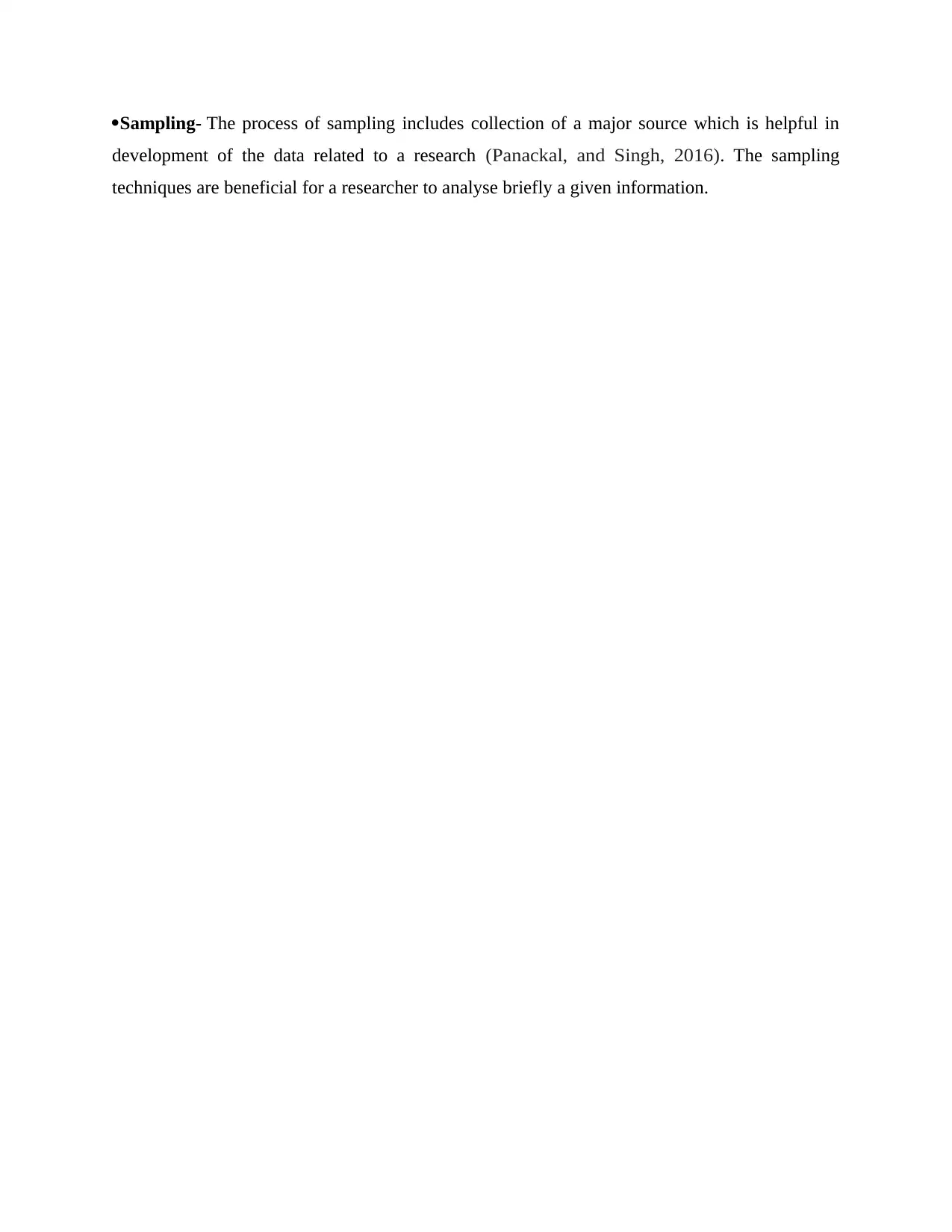
Sampling- The process of sampling includes collection of a major source which is helpful in
development of the data related to a research (Panackal, and Singh, 2016). The sampling
techniques are beneficial for a researcher to analyse briefly a given information.
development of the data related to a research (Panackal, and Singh, 2016). The sampling
techniques are beneficial for a researcher to analyse briefly a given information.
⊘ This is a preview!⊘
Do you want full access?
Subscribe today to unlock all pages.

Trusted by 1+ million students worldwide
1 out of 30
Related Documents
Your All-in-One AI-Powered Toolkit for Academic Success.
+13062052269
info@desklib.com
Available 24*7 on WhatsApp / Email
![[object Object]](/_next/static/media/star-bottom.7253800d.svg)
Unlock your academic potential
Copyright © 2020–2026 A2Z Services. All Rights Reserved. Developed and managed by ZUCOL.



